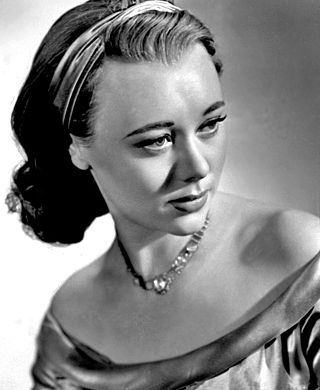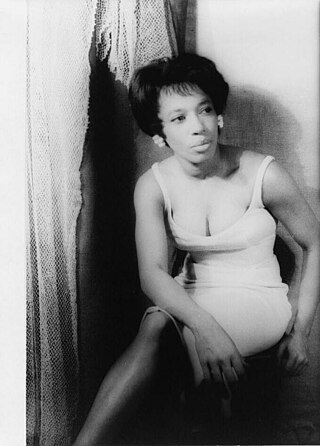Related Research Articles

Glynis Margaret Payne Johns was a British actress. In a career spanning eight decades on stage and screen, Johns appeared in more than 60 films and 30 plays. She received various accolades throughout her career, including a Tony Award and a Drama Desk Award as well as nominations for an Academy Award, a Golden Globe Award, and a Laurence Olivier Award. She was one of the last surviving major stars from the Golden Age of Hollywood and classical years of British cinema.

Nell Carter was an American singer and actress.

The Jazz Age was a period in the 1920s and 1930s in which jazz music and dance styles gained worldwide popularity. The Jazz Age's cultural repercussions were primarily felt in the United States, the birthplace of jazz. Originating in New Orleans as mainly sourced from the culture of African Americans, jazz played a significant part in wider cultural changes in this period, and its influence on popular culture continued long afterwards.

Lorraine Vivian Hansberry was an American playwright and writer. She was the first African American female author to have a play performed on Broadway. Her best-known work, the play A Raisin in the Sun, highlights the lives of black Americans in Chicago living under racial segregation. The title of the play was taken from the poem "Harlem" by Langston Hughes: "What happens to a dream deferred? Does it dry up like a raisin in the sun?" At the age of 29, she won the New York Drama Critics' Circle Award — making her the first African-American dramatist, the fifth woman, and the youngest playwright to do so. Hansberry's family had struggled against segregation, challenging a restrictive covenant in the 1940 U.S. Supreme Court case Hansberry v. Lee.

Linda Hopkins was a Tony Award-winning American actress and blues and gospel singer. She recorded classic, traditional, and urban blues, and performed R&B and soul, jazz, and show tunes.

The Palais-Royal is a former French royal palace located on Rue Saint-Honoré in the 1st arrondissement of Paris. The screened entrance court faces the Place du Palais-Royal, opposite the Louvre. Originally called the Palais-Cardinal, it was built for Cardinal Richelieu from about 1633 to 1639 by architect Jacques Lemercier. Richelieu bequeathed it to Louis XIII, before Louis XIV gave it to his younger brother, the Duke of Orléans. As the succeeding Dukes of Orléans made such extensive alterations over the years, almost nothing remains of Lemercier's original design.

Candida, a comedy by playwright George Bernard Shaw, was written in 1894 and first published in 1898, as part of his Plays Pleasant. The central characters are clergyman James Morell, his wife Candida and a youthful poet, Eugene Marchbanks, who tries to win Candida's affections. The play questions Victorian notions of love and marriage, asking what a woman really desires from her husband. The cleric is a Christian Socialist, allowing Shaw to weave political issues, current at the time, into the story.

L. Scott Caldwell is an American actress perhaps best known for her roles as Deputy U.S. Marshall Erin Poole in The Fugitive (1993) and Rose on the television series Lost.

Basil Sydney was an English stage and screen actor.

Diana Patricia Sands was an American actress, perhaps most known for her portrayal of Beneatha Younger, the sister of Sidney Poitier's character, Walter, in the original stage and film versions of Lorraine Hansberry's A Raisin in the Sun (1959).
John Paterson is a Canadian director, devisor, dramaturg, translator, actor and theatre creator who works across Canada, the United Kingdom, and internationally. His favourite credits include directing the installation of The List (BoucheWHACKED!), the site-specific The Women of Troy and F. Garcia Lorca’s The Love of Don Perlimplin for Belisa ; production dramaturgy on the English language premiere of H. Muller’s Macbeth: nach Shakespeare; and playing Adolf Hitler and Walt Disney in The Blue Light and Scheffler in The Ugly One.

Miss America 1923, was the third Miss America pageant, held at the Million Dollar Pier in Atlantic City, New Jersey on Friday, September 7, 1923.
Arnold Elston was an American composer and educator. Though he studied with Anton Webern, he did not himself use the twelve-tone technique.

Bluthochzeit is an opera in two acts by Wolfgang Fortner. The libretto, also by Fortner, is based on Enrique Beck's German translation of García Lorca's 1933 play Bodas de sangre. It premiered at the Cologne Opera on 8 June 1957.
The Nervous Set is a 1959 Broadway musical written by Jay Landesman and Theodore J. Flicker which centers on the Beat Generation. It tells the story of a wealthy publisher and his wife from a Connecticut suburb exploring the Greenwich Village of New York City as they navigate their dysfunctional marriage.

In seinem Garten liebt Don Perlimplin Belisa is an opera in two acts by Wolfgang Fortner. The libretto, also by Fortner, is based on Federico García Lorca's play Amor de don Perlimplín con Belisa en su jardín. It premiered at the opening of the 1962 Schwetzingen Festival.

Ernst Gutstein was an Austrian operatic baritone. He made an international career and also performed regularly at the Vienna State Opera. His repertoire included both tragic and comic characters, one of his signature roles being Faninal in Der Rosenkavalier by Richard Strauss. Gutstein created several roles in world premieres, such as Fortner's Perlimplin at the 1962 Schwetzingen Festival.

The Belle of Bohemia is an Edwardian musical comedy in two acts with music by Ludwig Engländer and Harry Truman MacConnell and lyrics and musical book by Harry B. Smith. The musical opened on Broadway in 1900 before having a run on the West End of London in 1901. It was one of a series of musicals with Belle in the title that were popular on both sides of the Atlantic in the Edwardian era.

Forrest Robinson was an American stage and silent era actor. He was a leading man at the Boston Museum Theater and acted in numerous theatrical productions in New York. He also appeared in numerous films.
The Cambridge Chekhov Company originated in a student production of Chekhov's Ivanov translated by Patrick Miles and directed by Laurence Brockliss and Patrick Miles at the ADC Theatre, Cambridge, 19–23 February 1974. It was presented by the Shadwell Society of Gonville & Caius College.
References
- ↑ "Elwood Smith". Playbill. Retrieved 2020-11-21.
- 1 2 Baptiste, Bala James (2019). Race and Radio: Pioneering Black Broadcasters in New Orleans. Univ. Press of Mississippi. ISBN 9781496822109 – via Google Books.
- 1 2 Hill, Errol; Hatch, James V. (July 17, 2003). A History of African American Theatre. Cambridge University Press. ISBN 9780521624435 – via Google Books.
- ↑ Powell (O.P.), Matthew (1998). God Off-Broadway: The Blackfriars Theatre of New York. Scarecrow Press. ISBN 9780810834170 – via Google Books.
- ↑ Hajdu, David (1996). Lush Life: A Biography of Billy Strayhorn. Macmillan. ISBN 9780374194383 – via Google Books.
- ↑ "A Raisin in the Sun (understudy)".
- ↑ "Tense Moment". Jet Magazine. March 2, 1961.